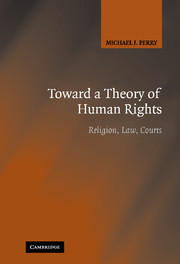Book contents
- Frontmatter
- Contents
- Acknowledgments
- Introduction
- TOWARD A THEORY OF HUMAN RIGHTS
- PART ONE THE MORALITY OF HUMAN RIGHTS
- 1 The Morality of Human Rights
- 2 The Morality of Human Rights: A Religious Ground
- 3 The Morality of Human Rights: A Non-Religious Ground?
- PART TWO FROM MORALITY TO LAW
- PART THREE FROM LAW TO COURTS
- Summation
- Notes
- Index
1 - The Morality of Human Rights
Published online by Cambridge University Press: 22 July 2009
- Frontmatter
- Contents
- Acknowledgments
- Introduction
- TOWARD A THEORY OF HUMAN RIGHTS
- PART ONE THE MORALITY OF HUMAN RIGHTS
- 1 The Morality of Human Rights
- 2 The Morality of Human Rights: A Religious Ground
- 3 The Morality of Human Rights: A Non-Religious Ground?
- PART TWO FROM MORALITY TO LAW
- PART THREE FROM LAW TO COURTS
- Summation
- Notes
- Index
Summary
Notwithstanding their European origins, … [i]n Asia, Africa, and South America, [human rights now] constitute the only language in which the opponents and victims of murderous regimes and civil wars can raise their voices against violence, repression, and persecution, against injuries to their human dignity.
Jürgen HabermasThe name of my state of origin – Kentucky – has been said to derive from a Native American word meaning “a dark and bloody ground”. An apt name for our century of origin is a dark and bloody time – indeed, the dark and bloody time: The twentieth century “‘was the bloodiest in human existence,’ … not only because of the total number of deaths attributed to wars – 109 million – but because of the fraction of the population killed by conflicts, more than 10 times more than during the 16th century.” The list of twentieth-century horrors, which plods on at mind-numbing length, includes much more than wars, however. As the century began, King Leopold II of Belgium was presiding over a holocaust in the Congo; it is estimated that between 1880 and 1920, as a result of a system of slave labor, the population of the Congo “dropped by approximately ten million people.” From 1915 to 1923, the Ottoman Turks, who were Muslim, committed genocide against the Armenian minority, who were Christian. Not counting deaths inflicted in battle, Stalin was responsible for the deaths of more than 42 million people (1929–53); Mao, more than 37 million (1923–76); Hitler, more than 20 million (1933–45), including more than 10 million Slavs and about 5.5 million Jews.
- Type
- Chapter
- Information
- Toward a Theory of Human RightsReligion, Law, Courts, pp. 3 - 6Publisher: Cambridge University PressPrint publication year: 2006



